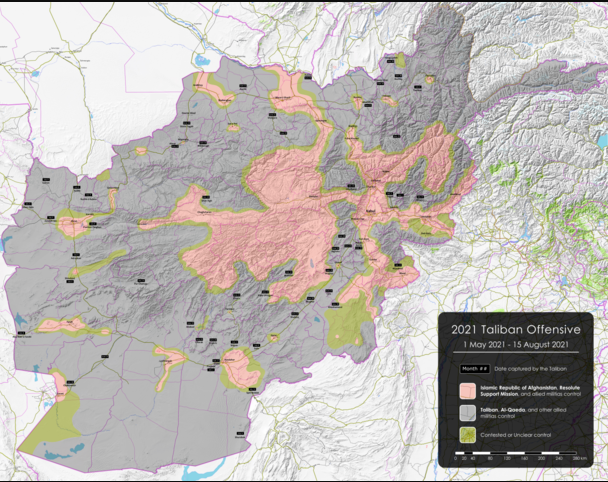
Abandoning Afghanistan: Why the US Should Do More to Help Our Afghan Allies
Since the United States became a country, its foreign policy has been split between two paradigms, one that is isolationist in nature and one that is more globalist. The question of American responsibility and its own self-interest in intervening in the affairs of other countries, both diplomatically and/or militarily, was a debate that continued to dominate American foreign policy in defining its view of its role in the world.
In the beginning of the 19th century, the Monroe doctrine emphasized to European nations that the US wouldn't tolerate interference in its affairs or new colonies in its periphery, essentially telling the Europeans "Mind your own business and we’ll mind ours." Later American administrations took a more globalist and interventionist approach to foreign policy, but by the beginning of the 20th century, American foreign policy was defined by its isolationist mentality and its reluctance to become entangled in the First World War. The US even restrained itself from declaring war after the sinking of the Lusitania, which killed around 1,200 Americans. The US only joined the allies after the German government began unrestricted warfare on American shipping and the discovery of the Zimmerman telegram, a German diplomatic telegram which proposed a military alliance with Mexico against the US.
Following the conclusion of the First World War, President Woodrow Wilson pushed for American participation in the League of Nations. However, Congress pushed back against his initiative, fearing that the US would get dragged into another European war. With the onset of World War II, America maintained its neutrality in the face of Nazi aggression (although the lend lease program enacted by President Roosevelt defined the US as more of a non-belligerent) and despite isolationism having failed in preventing American participation in World War I, it remained the underpinning of American foreign policy up to, and during the early parts of World War II.
Following Pearl Harbor and the conclusion of World War II, there was a shift towards a more interventionist and globalist foreign policy, because Pearl Harbor had showed the failure of isolationism as a dominant paradigm, because in both World Wars, events in the rest of the world, proved their interconnectedness with American security interests directly, despite American attempts to stay out of both conflicts. The following decades proved that military interventionism (indicated by the containment policy towards the USSR) had its drawbacks as well, with humiliating wars in Korea and Vietnam.
The recent American withdrawal from Afghanistan and looming withdrawal plans in Iraq harken back to this debate between isolationism and interventionism. Certainly, Afghanistan has been a brutal and costly conflict for the US and the conclusion of the American involvement in the conflict marks the end of America’s longest war. It is also a fair question to ask why American troops should maintain a presence there, in a conflict that seems practically unwinnable, for a cause that seems less certain with every passing year.
While Biden recently hosted President Ghani and pledged that America would stand by Afghanistan, claiming that America was confident in the Afghan Government's ability to protect itself, the nature of the American withdrawal, conducted in the middle of the night and with large amount of supplies left behind , and without telling their Afghani allies, doesn’t exactly demonstrate confidence in the Aghan government. This lack of confidence isn’t without reason. About half of the country is now controlled by the Taliban, which has stepped up its fight and captured a key city in the last week.
The return of the Taliban as a governing force for Afghan people would be a disaster for Afghan secularists and any Afghan supporters of US interests, as well as a potential safe haven for other jihadist groups. (The fact that the Taliban gave sanctuary to Osama Bin Laden was the very reason America sent troops there in the first place.) It would also be a major blow to overall American security interests.
This doesn’t mean that America should keep its troops on the ground there - particularly due to the geographic makeup of Afghanistan, which is a guerrilla fighter’s dream - but if the Afghani government is going to win this war, the US needs to give all possible aid (diplomatic, financial, and militarily, with heavy airstrikes) to President Ghani and his troops, to push back an enemy on the rise.
The US hasn’t only been scaling back its military’s commitments with Afghanistan; it has also reduced its financial aid as well. In 2019, US aid to Afghanistan was 4.9 billion dollars, in 2020 it was 1 billion, and 2021 it has been 139 million. This is a potentially disastrous mistake. The Afghan government will need American money to a greater and not lesser degree if it is to have a reasonable chance at avoiding collapse. Withdrawing American money and troops is the strategic equivalent of taking a patient off life support (and running out of the room), all the while stating your confidence in the patient’s ability to make a full recovery.
It is crucial that the United States learns the relevant lessons not only from its foreign policy mistakes in Afghanistan, but also from the last century. The flaws of Isolationism, as a foreign policy philosophy, have been shown time and time again. Interventionism isn't risk-free, and the US must weigh any military commitments carefully and attempt to pursue other means, if possible. However, American foreign policy is at its best when it can’t be defined easily by either isolationism or interventionism, but uses its muscle when it has a strong and relevant reason to do so. America’s might isn’t only a result of its wielding of the most powerful military in the world, but in its economy, technologies, influence, values, and people. If we neglect giving our Afghan allies the necessary financial aid that they need to wage an effective war against the jihadists, we may be reminded painfully in the future of the very reason we entered Afghanistan in the first place, when jihadists found a safe haven with the Taliban to plan attacks on US interests.
